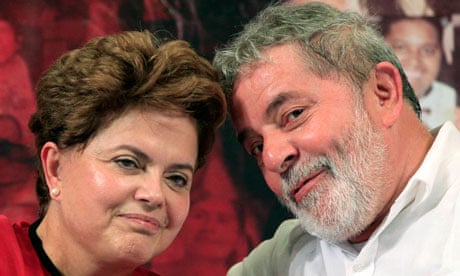He was Brazil's first working-class president; a football-obsessed former factory worker who swapped rural poverty for the highest office in his country and helped propel 20 million people out of poverty.
Tomorrow afternoon, the curtain will finally go down on Luiz Inácio Lula da Silva's eight-year reign when his successor, the former Marxist rebel Dilma Rousseff, steps out from a 1953 Rolls-Royce Silver Wraith and into the presidential hot seat.
Attended by 11 women with whom she was imprisoned during Brazil's dictatorship, Rousseff's inauguration will mark the official end of "Era Lula".
"I don't think we managed to achieve everything that we wanted to, but I think we have done more than at any other moment in the history of this country," Lula, 65, said this month during a rare meeting with foreign journalists. "We didn't solve all of Brazil's problems but we made extraordinary steps."
Lula, the former union leader whose meteoric rise smashed the traditional mould for Brazilian political leaders, leaves behind a radically transformed nation: business is booming and the long-excluded poor are on the rise.
The past eight years have seen at least 20 million Brazilians lifted from poverty, thanks to Lula's anti-hunger and income-transfer programmes.
Direct foreign investment has tripled to about $30bn (£19bn) a year since Lula took office in 2003 and many believe that by the time Rio de Janeiro hosts the 2016 Olympics, Brazil will be the world's fifth-largest economy.
In September, Brazil's state-controlled oil giant Petrobras was involved in a $70bn share offer – reputedly the largest in world history and another reminder of the country's growing economic muscle.
"Never before in the history of man have we had a capitalisation of this size," Lula boasted, deploying one of his most frequently used expressions.
Since Lula's 2002 election, "never before in history" has become the president's favourite – and in some quarters most ridiculed – catchphrase. But few question the major changes Lula has overseen. Tomorrow, he will leave power with astonishing approval ratings of close to 90%.
Fernando Barros e Silva, a political columnist from the Folha de São Paulo journal, said the popularity of Lula's government was "above all down to an objective improvement in the lives of the poorest. In spite of numerous problems in his government, including corruption, this is what Lula will be remembered for and rightly so."
Lula's biographer and friend, the writer Denise Paraná, said: "Lula's silent revolution has increased the national wealth and distributed the excess to the poorest classes. Lula has shown that a worker can be the boss, that an outsider can be president. He has symbolically redefined Brazil's class boundaries."
Gripes over how much personal credit Lula deserves for Brazil's current boom persist. Some describe the outgoing leader as the country's luckiest ever president, pointing to how his time in power has coincided with a lucrative commodities boom and the discovery of massive offshore reserves of oil that could turn Brazil into a major crude oil producer.
"Lula has gone down in Brazilian political history. But he did not invent the wheel, nor did he start from zero," Marco Aurélio Nogueira, a politics professor from São Paulo's state university, Unesp, wrote in a recent Lula retrospective. "He will not be missed as much as he or anyone else thinks."
In fact, with persistent speculation that Lula could seek re-election in 2014 or 2018, he may hardly be missed at all.
"For me, stopping doing politics would be the same as stopping to eat or to breathe," Lula wrote in his final weekly newspaper column as president this week. "The hypothesis of me abandoning politics doesn't exist."
Paraná said she expected Lula to set up an NGO to fight hunger in the developing world and described the chance of a return to the presidency as "very remote".
"His plans go far beyond simply being president," she said. "Today Lula is a man of the world, a political personality with great international clout who is looking to wider projects to combat hunger and poverty."
